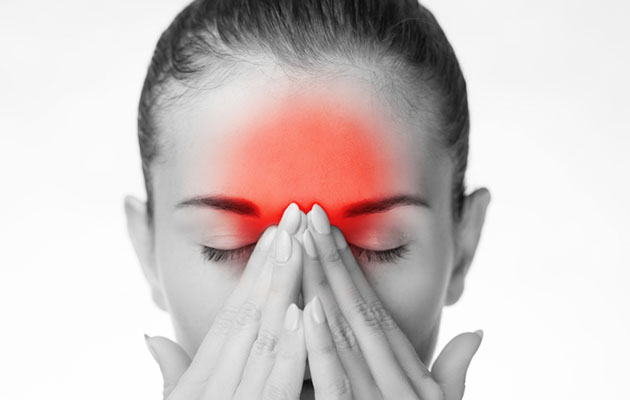What are migraines?
Migraine is very specific type of headache. Classically it’s a moderate to severe headache, which is throbbing in nature and tends to localised to particular area of the head.
Migraines differ from the more common tension – type headache, in that they tend to occur in episodes or clusters, it is very rare in experience migraines on a daily basis. Migraines are also associated with other symptoms such as nausea, vomiting and increased sensitivity to light.

What causes migraine?
The exact cause of migraines is unclear. They are known as vascular headaches because they are thought to be related to changes in blood flow in the brain. A popular theory is that blood vessels vaso-constrict and then vaso-dilate in response to changing levels of chemicals in the brain. The changes in chemicals can be triggered from a variety of causes such as food, drink, fatigue, medication, and can vary from person to person.
Migraines a common type of headache. They are more common in women, affecting 1 in 5 or us and 1 in 15 of men.
Triggers of migraine
This can be the trickiest area to uncover, as there are so many potential triggers which vary greatly from person to person. The most common triggers are;
Diet
This includes eating too much or one thing and not enough of others.
Irregular meals
Dieting for long periods
Cheese
caffeine
Chocolate
Red wine
Citrus fruit
Food additives; such as tyramine
Dehydration
Environmental factors
Cigarette smoke
Computer screens
Flickering light
String smells
Medicines
HRT Combined oral contraceptive pill
If you are on either of these hormonal medications and you have or develop migraines please see your doctor as changes need to be made to your medications and your health could at risk if you continue them.
Psychological
Depression
Anxiety
Fatigue
Lack of sleep
Stress
Hormonal changes
Menstrual migraine, this is due to changes levels of oestrogen during your cycle – Menopause.
Types of migraine
Migraine with aura
Warning symptoms develop before the migraine symptoms set in. Aura symptoms include;
Visual disturbance; temporary loss of vision, changes in light, objects rotating in the visual field.
Numbness / pins and needles. This can affect face, hands or arm.
Speech can be temporally affected
Odd smells and other odd sensations can also develop temporarily.
Migraine without aura
This is the most common type of migraine.
Silent migraine
This is the least common type of migraine. In this case aura symptoms occur, before the headache symptoms do not develop.
Diagnosis
If you experience any of the symptoms above, it is important to see your doctor to assess your symptoms thoroughly.
Migraine diagnosis is made based on the clinical symptoms. Your doctor will also run some blood tests to ensure there are no underlying causes which could be causing your symptoms.
Treatment options
Simple painkillers. First line treatment involves such a paracetamol and ibuprofen.
Triptans are a specific group of medications which can be prescribed your doctor. There mechanism of action involves targeting the chemical changes in the brain which leads to the changes in blood flow in the brain which is the underlying cause of migraine.
Anti-emetic medications (anti-sickness drugs) can be prescribed if nausea and vomiting are part of your symptoms.
If your migraine symptoms are severe and affecting your ability to function; on a daily basis, it is important to see your doctor.
There are many medications that can be prescribed as prophylaxis, to prevent you develop the migraines so frequently and severely.
It is worthwhile to keep a headache diary to see if a pattern emerges regarding the possible triggers to your migraine. The biggest challenge is often identifying the triggers, but once they have been established and avoided, the frequency and severity of migraines can be significantly reduced.
Summary
Migraines are a very common type of headache.
They are vascular headaches (caused by changes in blood flow in the brain).
They are a multitude of possible causes which are unique to you.
Keep a headache diary to help identify this.
Periods, the pill and HRT are big causes for us women to remember (if you are on the pill / HRT and have migraines – see your Doctor ASAP).
There are many medications to try; both over the counter and on prescription.
Prophylactic medication is also an option to help prevent migraines.
Dr Jane Leonard
MBCHB. BSC HONS (1ST ) MRCGP
Liverpool – Manchester – London
104 Harley Street, London W1G 7JD
Dr Jane Leonard is a fully qualified GP and Cosmetic doctor, graduating from the University of Manchester. She also has a first class honours degree in anatomical sciences, in which she focused her studies on the anatomy of the face, head and neck.
She completed her aesthetic training on Harley Street following a stint at The Alfred Hospital Medical Research Centre, in Melbourne, Australia. Her work in Dermatology research has been published in the prestigious Australasian Journal of Dermatology.
Almost a decade of aesthetic treatment experience, Dr Leonard has been nominated for the Cosmetic Doctor of the Year in the prestigious Safety in Beauty Diamond Awards.